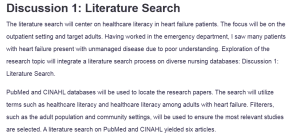Discussion 1: Literature Search
The literature search will center on healthcare literacy in heart failure patients. The focus will be on the outpatient setting and target adults. Having worked in the emergency department, I saw many patients with heart failure present with unmanaged disease due to poor understanding. Exploration of the research topic will integrate a literature search process on diverse nursing databases: Discussion 1: Literature Search.
PubMed and CINAHL databases will be used to locate the research papers. The search will utilize terms such as healthcare literacy and healthcare literacy among adults with heart failure. Filterers, such as the adult population and community settings, will be used to ensure the most relevant studies are selected. A literature search on PubMed and CINAHL yielded six articles.
Literature search on the elicit AI research assistant tool utilized the search terms health literacy, patients with heart failure, and community setting. Filters such as adult populations were also added to the process. Elicit requires the user to type in the research question. It then provides a summary of the top findings before listing the individual articles produced from the search process.
The search processes on the topic of the study yielded four articles. The search process on Elicit and PubMed/ CINAHL differs as Elicit requires the user to key in the full research questions rather than specific search terms.
Gomez et al. (2022) and Nesbitt et al. (2021) were some of the top articles retrieved from elicit. The generated abstracts are similar to the provided abstracts. However, they are narrow in scope as they do not cover the methodologies used or the background of the study. While both tools are effective in obtaining biomedical research, I prefer PubMed or CINAHL.
PubMed contains vast biomedical research. It may, however, produce results that are less relevant to the study. Elicit, on the other hand, is helpful in refining the search process, yielding the most relevant sources.
On the downside, it misses out on some aspects of the study, such as the methodologies used. CINALH contains vast nursing research papers. It is, however, difficult to use due to the bulkiness of the articles produced from the search process.
References
Gomez, R., Andrey, J. L., Puerto, J. L., Romero, S. P., Pedrosa, M. J., Rosety-Rodriguez, M., & Gomez, F. (2022). Health Literacy and prognosis of heart failure: A prospective propensity-matched study in the community. European Journal of Cardiovascular Nursing, 22(3), 282–290. https://doi.org/10.1093/eurjcn/zvac045
Nesbitt, K., Du, H., Nolan, P., Cartledge, S., Wonggom, P., & Clark, R. A. (2021). The relationship between health literacy and self-care in patients with heart failure. British Journal of Cardiac Nursing, 16(3), 1–10. https://doi.org/10.12968/bjca.2020.0128
ORDER A PLAGIARISM-FREE PAPER HERE
We’ll write everything from scratch
Question
Directions:
Refer to the Rubric for instructions and details on required content, word limits, required references, etc. Keep the focus on the intent of the assignment, and do not allow yourself to drift too far. The rubric can be viewed by clicking the three (3) dots on the top right of the screen. A printable version is available here: Printable Rubric Download Printable Rubric
Please review all instructional video(s) for this Discussion in the module.In this Discussion, you will use Elicit Artificial Intelligence (AI) Research Assistant to conduct a literature search. https://elicit.org/ Links to an external site.

Discussion 1: Literature Search
To get started, you will need to sign up for a free account with Elicit AI Research Assistant: https://elicit.org/signup Links to an external site.
- For the first three questions on rubric
- 1. POI topic: health care literacy in heart failure Patients
- 2. outpatient setting
- 3. I work in the emergency department and a lot of heart failure pt come in with an unmanaged disease due to know understanding

